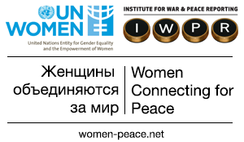
Women, Peace, and Security, Humanitarian and Disaster Risk Reduction

UN Women supports the Government of Georgia in developing and carrying out the National Action Plan for the Implementation of the UN Security Council Resolutions on Women, Peace and Security (UNSCR 1325 (2000) et al.) and achieving the targets of nationalized Sustainable Development Goals 5 and 16. Since 2001, UN Women (previously UNIFEM) has provided continuous support to partners in Georgia to increase the meaningful participation of women in conflict prevention, transformation, resolution and sustainable peacebuilding processes.
UN Women works with security sector actors, including the Ministry of Defence, the Ministry of Internal Affairs, the State Security Service, the Office of the National Security Council and the Georgian Intelligence Service, to mainstream gender into the Security Sector Reform process and its outcomes. Accordingly, to promote the implementation of the Women, Peace and Security agenda (WPSA) and mainstream gender in the security sector, UN Women cooperates with the Ministry of Foreign Affairs, the State Ministry for Reconciliation and Civic Equality, the Ministry of Internally Displaced Persons from the Occupied Territories, Labour, Health and Social Affairs of Georgia, the LEPL Internally Displaced Persons, Ecomigrants and Livelihood Agency and the Ministry of Regional Development and Infrastructure of Georgia.
UN Women also continues to support the capacity development of women mediators and peacebuilders alongside internally displaced and conflict-affected women at the grass-roots level to ensure all stakeholders’ direct and meaningful participation in peace processes. To that end, UN Women works to create spaces for the effective engagement of women peace activists with the participants of formal peace and incident prevention processes (namely, the Geneva International Discussions and the Incident Prevention and Response Mechanism).
One of UN Women’s top priorities for the 2022–2024 period is to provide support for the localization of the fourth National Action Plan for the Implementation of the UN Security Council Resolutions on Women, Peace and Security. The localization process is achieved through fostering the active participation of women’s grass-roots organizations alongside internally displaced and conflict-affected women in local policy planning and budgeting processes, as well as the capacity-building of the local governments to advance WPSA implementation. In this respect, UN Women is targeting 17 municipalities in the regions of Kvemo Kartli, Shida Kartli, Imereti, Samegrelo-Zemo Svaneti, and Racha-Lechkhumi and Kvemo Svaneti, including the villages that are adjacent to the Administrative Boundary Lines with Abkhazia, Georgia, and the Tskhinvali region/South Ossetia, Georgia.
UN Women has partnered with the Governments of the United Kingdom since 2020 and Denmark since 2023 to increase women’s meaningful participation in peace and security processes and to increase the Georgian Government’s accountability to implement the WPSA in Georgia.
In 2024, with the support of the Government of Switzerland, UN Women expanded its portfolio to focus on elevating women’s agency and influence in climate action decisions, increasing women’s and girls’ agency to effectively engage in disaster risk reduction mitigation and adaptation and in climate change actions. Through this initiative, UN Women will empower female farmers and women-led businesses by introducing them to climate-friendly agricultural and business practices. Additionally, UN Women aims to strengthen evidence-based policymaking at the institutional level by enhancing the collection and analysis of sex-disaggregated data. Through these efforts, UN Women is committed to creating a more inclusive and resilient approach to managing climate change impacts in Georgia—and specifically for women and girls, who remain the most affected as a result of natural hazards and their repercussions.
